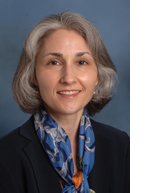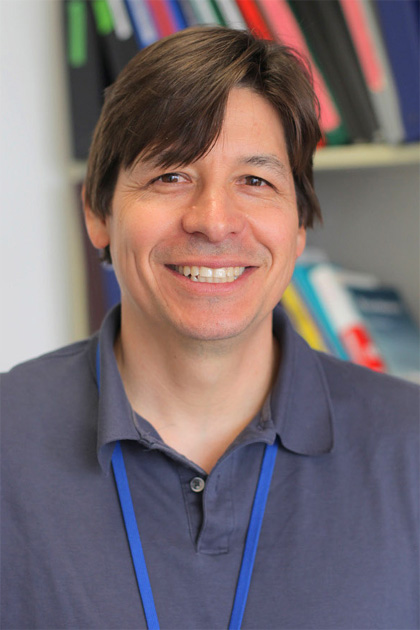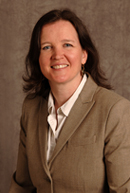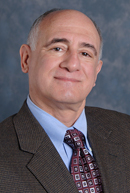Deborah Cabaniss, MD
 My name is Deborah Cabaniss, and I'm the Associate Director of Residency Training and Director of Psychotherapy Training. My job is to help Columbia psychiatry residents get the best education in psychotherapy that we can possibly offer them. I have a great job, not only because I love to teach and supervise, but also because I get to work with so many great teachers, supervisors and residents.
My name is Deborah Cabaniss, and I'm the Associate Director of Residency Training and Director of Psychotherapy Training. My job is to help Columbia psychiatry residents get the best education in psychotherapy that we can possibly offer them. I have a great job, not only because I love to teach and supervise, but also because I get to work with so many great teachers, supervisors and residents.
As for me... I'm a “homegrown” faculty member – I've been here ever since I graduated from college. Meeting psychiatrists from all over the country keeps me constantly aware of how outstanding my Columbia training was. The psychotherapy training and supervision I received as a resident shaped my career, my interest in psychoanalysis, and my life. Today, psychotherapy training is still prioritized in the residency program. Courses in psychotherapy are part of the core curriculum of every year of training, psychotherapy is taught on all of the PGY-II rotations, and classroom time is “protected” – even for residents in the ER and on the inpatient units. As a Columbia resident, you will become an excellent psychotherapist!
This is a unique department of great breadth and depth. Whatever your interest, there's someone here who's doing cutting edge work in that area and who has trainees working with them. We're looking forward to meeting you!
E. David Leonardo, M.D.
 As the Associate Director of Residency Training and for Neuroscience and Research, I oversee resident research experiences, help residents to identify opportunities, and provide guidance and mentorship once the research experience is underway. In addition, I oversee the neuroscience curriculum for the residency, ensuring that our residents have broad exposure to key neuroscience concepts in ways that are accessible and applicable to their clinical experience.
As the Associate Director of Residency Training and for Neuroscience and Research, I oversee resident research experiences, help residents to identify opportunities, and provide guidance and mentorship once the research experience is underway. In addition, I oversee the neuroscience curriculum for the residency, ensuring that our residents have broad exposure to key neuroscience concepts in ways that are accessible and applicable to their clinical experience.
I arrived at Columbia almost 20 years ago with the goal of establishing a basic neuroscience research career that was informed by excellent clinical training in psychiatry. Since then, I have been fortunate to pursue this goal amongst a group of immensely talented colleagues- both psychiatrists and neuroscientists endeavoring to understand how the brain works with the aim of restoring function when things go awry. At the same time I have maintained a clinical practice, which, while deeply rewarding, keeps me humble about the limitations of our current knowledge.
This is an exciting time to become a psychiatrist as the field wrestles with integrating our clinical lexicon with the rapid progress in the understanding of brain biology. I look forward to working with, and helping to develop, a new generation of psychiatrists passionate about moving the field forward through research and practice.
Eileen Kavanagh, MD, MPA
 My name is Eileen Kavanagh and I serve as the Director of the NYS Psychiatric Institute Residents’ Clinic (PIRC), the main outpatient training site for PGY3s and PGY4s. I feel very fortunate to have a job where there is such a wonderful mix of direct clinical care and teaching of trainees. At PIRC, the goals of providing top quality care to patients and a rich education to future psychiatrists go hand in hand.
My name is Eileen Kavanagh and I serve as the Director of the NYS Psychiatric Institute Residents’ Clinic (PIRC), the main outpatient training site for PGY3s and PGY4s. I feel very fortunate to have a job where there is such a wonderful mix of direct clinical care and teaching of trainees. At PIRC, the goals of providing top quality care to patients and a rich education to future psychiatrists go hand in hand.
Prior to my medical training, I was a teacher and have always wanted teaching to be an integral part of my career. After residency, I spent a number of years as a clinical teacher at one of the main teaching rotations for PGY2s. From my mentor there I learned the ins and outs of running a busy clinic with high standards of clinical care but I also learned about the importance of creating a collegial and productive training atmosphere where residents are eager to learn, ask questions and seek readily available supervision when they need to. Every day I get to see patients with residents and we grapple with new clinical questions and dilemmas together – one of the best parts of my job.
Philip R. Muskin, M.D.
 My name is Philip Muskin and I run the Department of Consultation-Liaison psychiatry. Several years ago I had an epiphany. It had been a busy day; patients in the morning, many phone calls from residents about vexing patient problems on the Consultation-Liaison Service, several journeys on the internet to quickly research answers to questions by accessing literature, and a question from a faculty member about a spouse regarding when it is appropriate to use an implantable defibrillator for an arrhythmia (sending me into a frantic literature search in uncharted territory for me). What occurred to me on that day was how much fun it is to be a faculty member at Columbia. That luck is a combination of the remarkable resources available at one of the world's leading medical centers, a Department of Psychiatry that is arguably as “good as it gets,” residents who are culled from the most outstanding medical students in the country, and a faculty of wonderful and brilliant people.
My name is Philip Muskin and I run the Department of Consultation-Liaison psychiatry. Several years ago I had an epiphany. It had been a busy day; patients in the morning, many phone calls from residents about vexing patient problems on the Consultation-Liaison Service, several journeys on the internet to quickly research answers to questions by accessing literature, and a question from a faculty member about a spouse regarding when it is appropriate to use an implantable defibrillator for an arrhythmia (sending me into a frantic literature search in uncharted territory for me). What occurred to me on that day was how much fun it is to be a faculty member at Columbia. That luck is a combination of the remarkable resources available at one of the world's leading medical centers, a Department of Psychiatry that is arguably as “good as it gets,” residents who are culled from the most outstanding medical students in the country, and a faculty of wonderful and brilliant people.
I am an academic psychiatrist. For me, being an academic psychiatrist requires that the individual spend part of the workweek in the process of education. This activity must be a central part of the person's identity as a psychiatrist. Since I loved both medicine and psychiatry, it's not surprising that my area of academic psychiatry is Consultation-Liaison.
I hope that some of you who read this “perspective” will become enthralled by the idea of being an academic psychiatrist and will choose to join the ranks of those of us in this noble, creative, flexible, and exciting career. If so, Columbia would be a great place to start your career.
Mary Sciutto, M.D.
My name is Mary Sciutto and I’m the Medical Director of the Columbia Psychiatry Specialty Clinics, an Advisory Dean of the Medical School, and the director of the Columbia University Psychiatry Residency Advisory Program (CU RAP). CU RAP links all of our psychiatry residents with faculty in the department in an effort to help residents as they make critical decisions about their careers. I’ve come to realize that while our residents are extraordinarily talented and our faculty has both breadth and depth, our residents still need guidance throughout their four years. In the early years of residency our mentorship program helps trainees as they navigate their required rotations; As residents progress through the residency program and hone their interests within the filed, we help them make choices about clinical electives and research opportunities . Toward the end of residency, we focus on broader career issues, from setting up a private practice to looking for jobs to launching successful post-training academic and research careers.
I’ve been tremendously gratified by my work with Columbia residents and I’ve become particularly interested in the challenges of combining a demanding career with the responsibilities of raising children. I try to use my own experiences as a professional and a mother raising children in New York as I work with our residents who are often balancing career and family responsibilites. I’m excited about continuing my work with residents in helping them realize their professional goals as they maintain a healthy balance in their lives.
